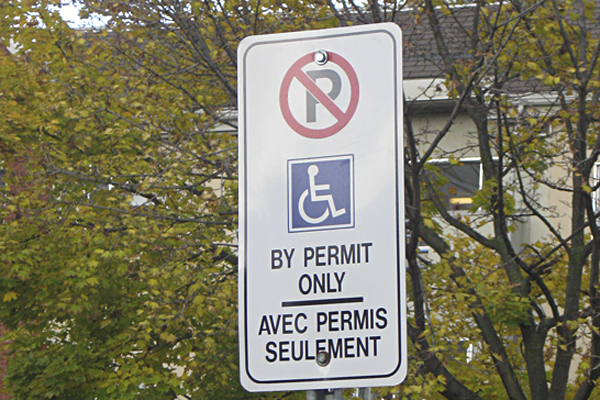Organizer, student groups say U of O in need of accommodations policy
Photo: Mackenzie Powell
Groups on campus hope an upcoming lecture by jes sachse, a Toronto-based disability artist and activist, will bring about a push for greater accessibility at the University of Ottawa.
The Institute of Feminist and Gender Studies has worked with Banting post-doctoral fellow Christine Kelly to host the lecture, which will discuss art as an emancipatory practice for disabled and other marginalized people, said Kelly.
Accessibility issues are still a major challenge on campus, according to Kelly, who specializes in disability studies.
“Accessibility accommodations currently work in the medical model: You need a doctor’s note and paperwork to get anywhere, so there’s not a lot of room for critique or social approach,” she said.
“I think that the current system will always make accessibility a painful and difficult experience until there’s new ways of thinking about accessibility,” said Kelly. “jes sachse is working at changing those frameworks on a broad cultural scale.”
The Student Rights Centre (SRC) recently highlighted the university’s lack of an academic accommodations policy when they handed out a flyer that listed the “top five reasons” not to attend the U of O.
The U of O said in a statement that they’re in the process of developing a policy in collaboration with the SRC. The Student Academic Success Service (SASS) also runs the Access Service Office, which offers additional support to students living with disabilities.
“Professors also have access to a guide describing the strategies and adaptive measures they can apply to create an inclusive academic environment for students living with disabilities,” according to the university’s statement.
The Centre for Students with Disabilities (CSD) provides resources such as a library, drop-in space, support listening, training, consultations, and loaning of crutches and wheelchairs.
CSD coordinator Norah Dillon-Cheetham said one example of the university’s lack of accommodation is its policies on graduate students with disabilities who work as teaching assistants.
“The minimum number of course requirements or the minimum number of hours that they have to complete … is creating barriers for students with disabilities,” said Dillon-Cheetham.
One student told the CSD that her scholarship meant she had to work as a TA, but she couldn’t work the required hours. Even after having the time requirement reduced, she said she’s still struggling.
The CSD is asking the university that the academic accommodations policy respects their duties under the Ontario Human Rights Code, according to Dillon-Cheetham.
She said there is no common understanding among professors and administrators about accommodations. “It creates barriers for students when requesting accommodations,” she said. “The doors are shut in their face.”
—With files from Nadia Drissi El-Bouzaidi





